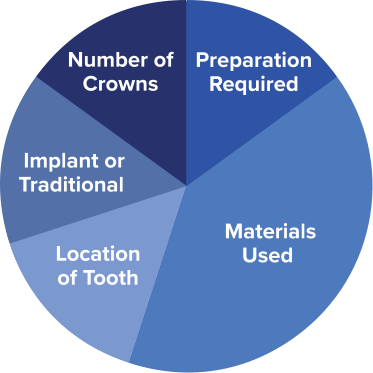Dental Crown Cost
Dental crowns can be a great option for patients with decayed, broken, or missing teeth. Although most insurance companies may cover or partially cover the cost of your restorative treatment, the final dental crown cost will be dependent on a number of factors including the extent of your damage, whether your crown is manufactured onsite or in a lab, and your desired results. During your consultation, your doctor will assess your condition and recommend a treatment plan that best helps you restore long-lasting health to your smile. The starting cost for a dental crown can range anywhere from $500 to $2,500.
Factors Affecting Cost

The cost of a crown is dependent on the experience of your dentist, and the materials used.
Factors that Affect Cost
Every smile is different, and the final cost of a dental crown may vary from patient to patient. Although a large part of the cost will depend on the condition of your smile, you may find that there are a few factors that can be customized to adjust the price of your treatment.
Extent of Damage
The higher the level of decay or damage to your tooth, the higher the cost of your crown will be because of the preparation required prior to placing the crown. If you choose a dental crown to repair damage after root canal therapy, the cost of your procedure will be higher because your dentist must first remove the infection from your tooth. This is usually done over two appointments. If you are choosing a dental crown to replace a missing tooth, the cost will be higher because your doctor will likely recommend a dental implant.
Manufacturing
Many offices are equipped with on-site computer-aided design and manufacturing units which can be used to create stunning, durable same day porcelain crowns. Dentists are able to design and create crowns on the same day of your appointment, eliminating laboratory costs. In general, crowns produced on a CAD/CAM system such as CEREC® or E4D® are more cost-effective than crowns manufactured in a lab. Same day crowns also eliminate the need for temporary crowns, which can add to the cost of your treatment.
Traditional or Implant-Retained
If you are receiving a dental crown to restore a missing tooth, your dentist may recommend a dental implant. Placed during oral surgery, this biocompatible implant will securely anchor your crown directly to your jawbone and provide superior support and stability. A single implant costs between $1,600 and $2,200.
Whether Sedation Is Needed
In general, crowns produced on a CAD-CAM system such as CEREC or E4D are more cost-effective than crowns manufactured in a lab
As dental crowns are not placed during surgery, most patients do not require sedation. However, patients with dental phobia or a fear of the dentist may choose to receive medication or intravenous (IV) sedation to ease their anxiety during the procedure. Choosing sedation can also add to the overall cost of your treatment.
Materials Used
Although your dentist will help you choose a material that best suits your condition and desired outcomes, the material can also affect the price of your crown. Materials range in quality, aesthetics, and price. Common materials used for crowns include:
- Metal: Metal crowns are ideal for back teeth because of their cosmetic disadvantage, but they are good options for patients with bruxism (teeth grinding and jaw clenching) and patients who are on a budget.
- Porcelain-fused-to-metal: These restorations are also good options for patients who are prone to tooth grinding. Although they are a more cosmetic option than all-metal crowns, they do not provide the same level of aestheticism as all-porcelain restorations.
- Tooth-Colored: All-porcelain and all-ceramic are more expensive options because they closely mirror the color and aesthetics of your tooth. However, they may not be as durable as metal restorations. All-resin crowns are a cost-effective, tooth-colored option, but they are also prone to excessive wear and breakage.
- Zirconia: Zirconia crowns are the most expensive option, but offer outstanding aesthetics and durability. These crowns closely mirror the texture, color, and translucency of your natural smile but are not as fragile as conventional tooth-colored porcelain restorations.
During your initial consultation, your dentist will help you decide which materials are an option based on your oral health, concerns, and budget.
Number of Crowns Needed
The more crowns you require, the higher the cost of your overall treatment will be. However, matching the texture and shade of your teeth is a difficult process, and many dentists offer a discount per unit if you are receiving multiple crowns at once.
Combining Crowns with Other Treatments
Although crowns can help restore strength, structure, and aesthetics to your teeth, you may require additional treatment if you have extensive oral health issues. When combined with other procedures such as gum disease treatment, dental implants, and joint therapy, the total cost of your rehabilitation will be higher.
Financing Your Treatment
If they are being used to treat decay, broken teeth, or other functional issues, dental crowns are not considered cosmetic restorations and will typically be covered by your insurance company. However, insurance companies may not cover the price of additional services or custom materials.
